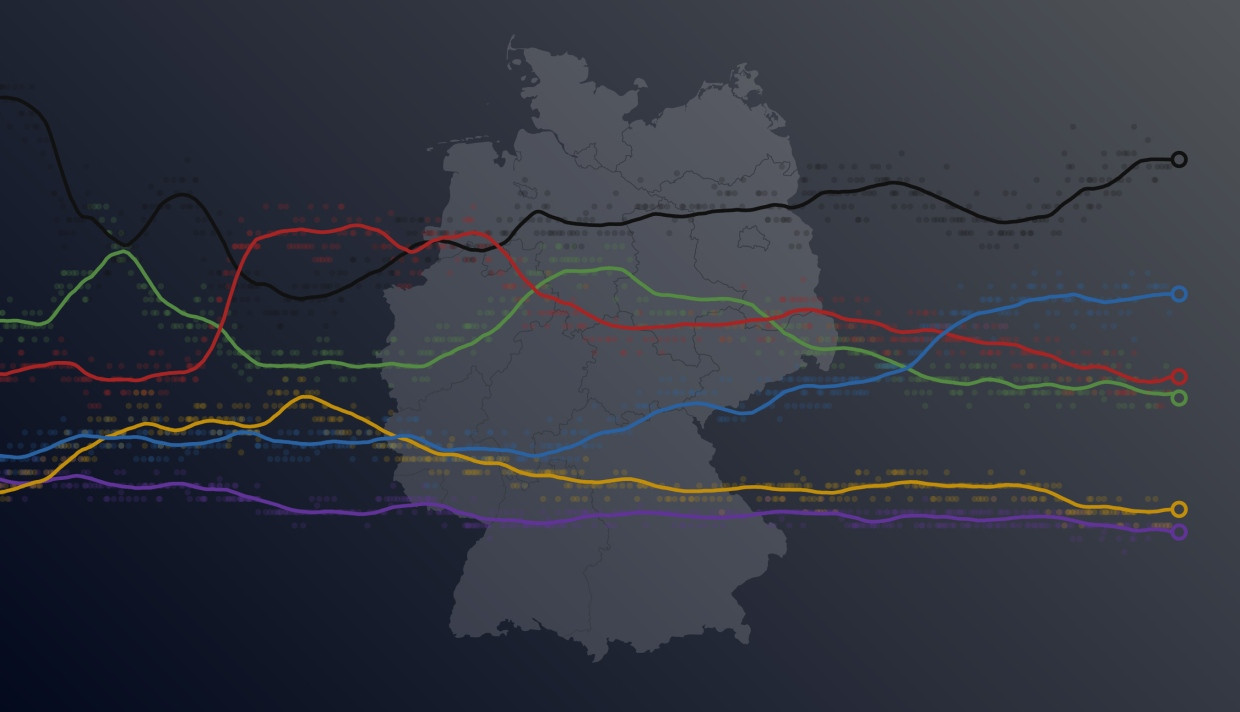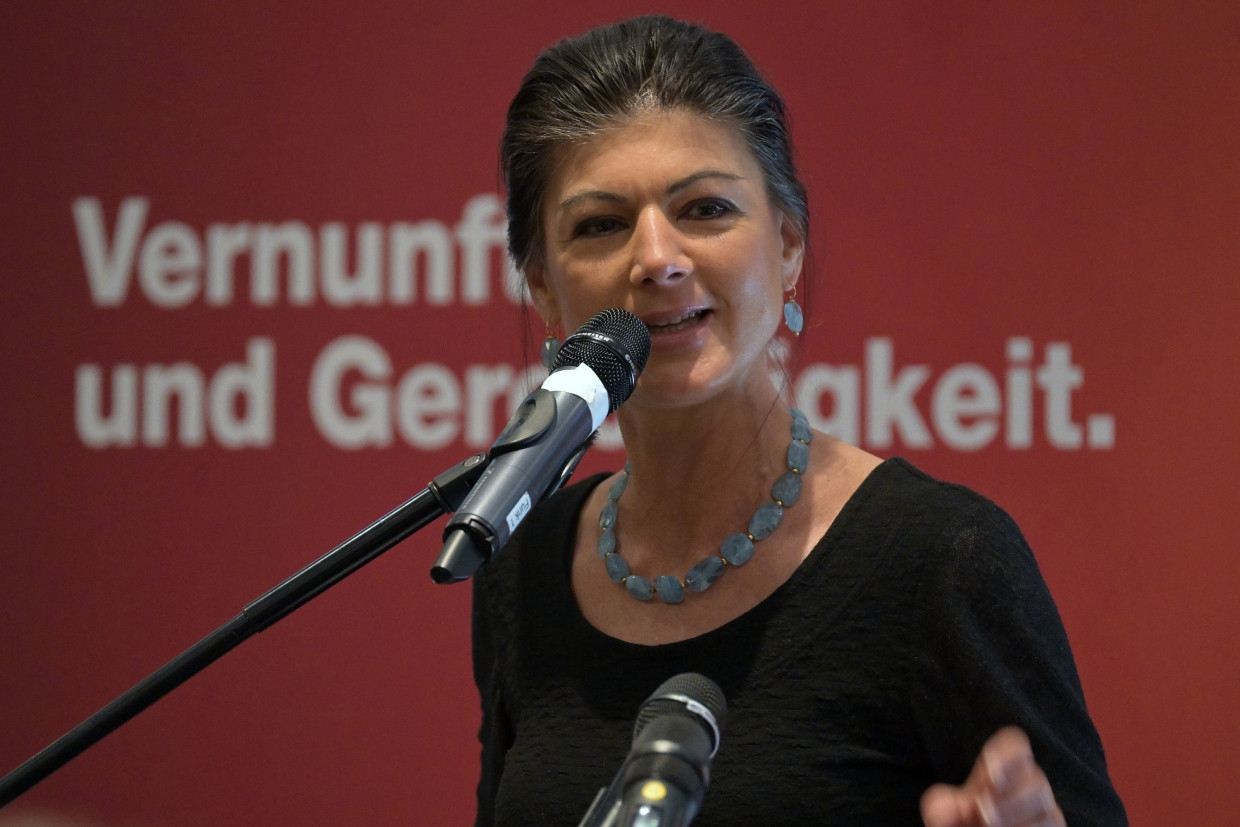Alle Umfragen zeigen für sie im Blick auf den Herbst nur in eine Richtung: nach oben. An Sahra Wagenknecht kommt nach den drei Landtagswahlen in Ostdeutschland wohl niemand vorbei, der dort weiter oder nach langer Zeit wieder regieren will.
In Sachsen und Thüringen wird es nach dem 1. September die CDU sein, die nach Lage der Dinge auf das nach Wagenknecht benannte Bündnis angewiesen ist. Und drei Wochen später in Brandenburg könnte die dort schon seit einer Ewigkeit regierende SPD um Wagenknechts Gunst buhlen müssen.
Denn in allen drei Ländern wird die teilweise als rechtsextrem eingestufte AfD womöglich zur stärksten politischen Kraft. Nur mithilfe des bei der Europawahl in Ostdeutschland zur drittstärksten Partei aufgestiegenen BSW ließen sich dann stabile Landesregierungen jenseits der AfD bilden.
So bekommt das anfangs belächelte Wagenknecht-Projekt einer links-konservativen Partei mit einem kräftigen Schuss Populismus schon nach wenigen Monaten eine reale Machtoption in gleich drei Bundesländern. Das ist eine Position, die nach der Bundestagswahl im nächsten Jahr bei einem möglichen zweistelligen Stimmenanteil des BSW auch in Berlin die Koalitionskarten neu mischen dürfte.
Warnendes Beispiel AfD
Bis jetzt scheint der Wagenknecht-Zug schneller seine Stationen zu erreichen, als es im Fahrplan vorgesehen war. Es ist ein Plan, der die Fehler ihres ersten gescheiterten Versuchs mit der schlecht organisierten Sammlungsbewegung „Aufstehen“ bisher vermieden hat. Und durch eine von der BSW-Spitze kontrollierte Aufnahmeprozedur soll in der bisher nur wenige Hundert Mitglieder zählenden Partei eine Entwicklung wie in der AfD verhindert werden. Aus der bürgerlich-konservativen Professorenpartei wurde binnen weniger Jahre eine von Rechtsextremen gekaperte Truppe.

The biggest asset that the BSW was able to use in the European elections is the party leader herself. Her name has become a brand that attracts voters. According to surveys, almost eighty percent of BSW voters said they only voted for the new party because of Sahra Wagenknecht. The fact that charismatic leaders almost single-handedly lead populist parties to success is demonstrated by Geert Wilders in the Netherlands. Angela Merkel's famous phrase “You know me” also applies to Wagenknecht.
The former Left Party parliamentary group leader is a regular on political talk shows. With confident television appearances, on her YouTube channel and through her bestseller “The Self-Righteous”, she has already gained a loyal fan base and a high level of fame before the founding of her party in January. She has nothing but contempt and ridicule for her former party, the Greens, and a left-wing or alternatively neoliberal, but definitely “woke” elite.
Instead of addressing the concerns of employees and tradespeople, the agenda of this “lifestyle left” is limited to radical climate protection, unchecked migration and the fight for the rights of sexual minorities. With a program already outlined in the book, Wagenknecht has discovered a gap in representation in the offerings of the established parties, which the BSW is now filling.

In terms of social policy, it appeals to SPD and Left Party voters who are equally disappointed with the issues of wages, pensions, taxes and rents and who long for their lost political home. This home is also embodied by Wagenknecht's closest advisor and husband Oskar Lafontaine. The EU-critical BSW is also attractive to voters who voted for the AfD not out of right-wing extremist sentiments, but in protest against uncontrolled migration.
Election hit: arms deliveries
The once staunch communist even has a lot to offer CDU and FDP supporters. With her paean to Ludwig Erhard and Helmut Kohl, a strong middle class, ordoliberalism and Catholic social teaching, Wagenknecht cleverly stirs up sentiment against CDU leader Friedrich Merz, who sees her as an extremist. She denounces him as a neoliberal lobbyist for global financial investors such as Blackrock, for whom Merz worked as a business lawyer.
Wagenknecht has made the dispute over arms deliveries to Ukraine the focus of her election campaign and at the same time a point of contact with the East German CDU. She knows how unpopular in this part of the CDU is the demand that Merz has been making on a weekly basis until recently for Taurus cruise missiles for the Ukraine invaded by Putin.
War or peace? Wagenknecht already scored points in the European elections in East Germany with this slogan on her poster above her portrait. She is thereby tapping into a mood that is also directed against NATO and the USA. This is another reason why an alliance of convenience with the rhetorically adept Wagenknecht could prove to be a dangerous divisive factor for the CDU under Merz. And this in the year of the federal election.









